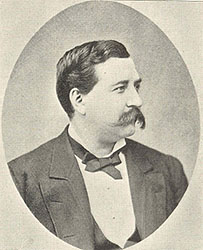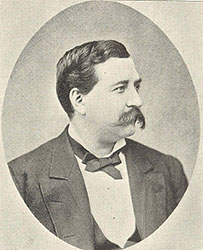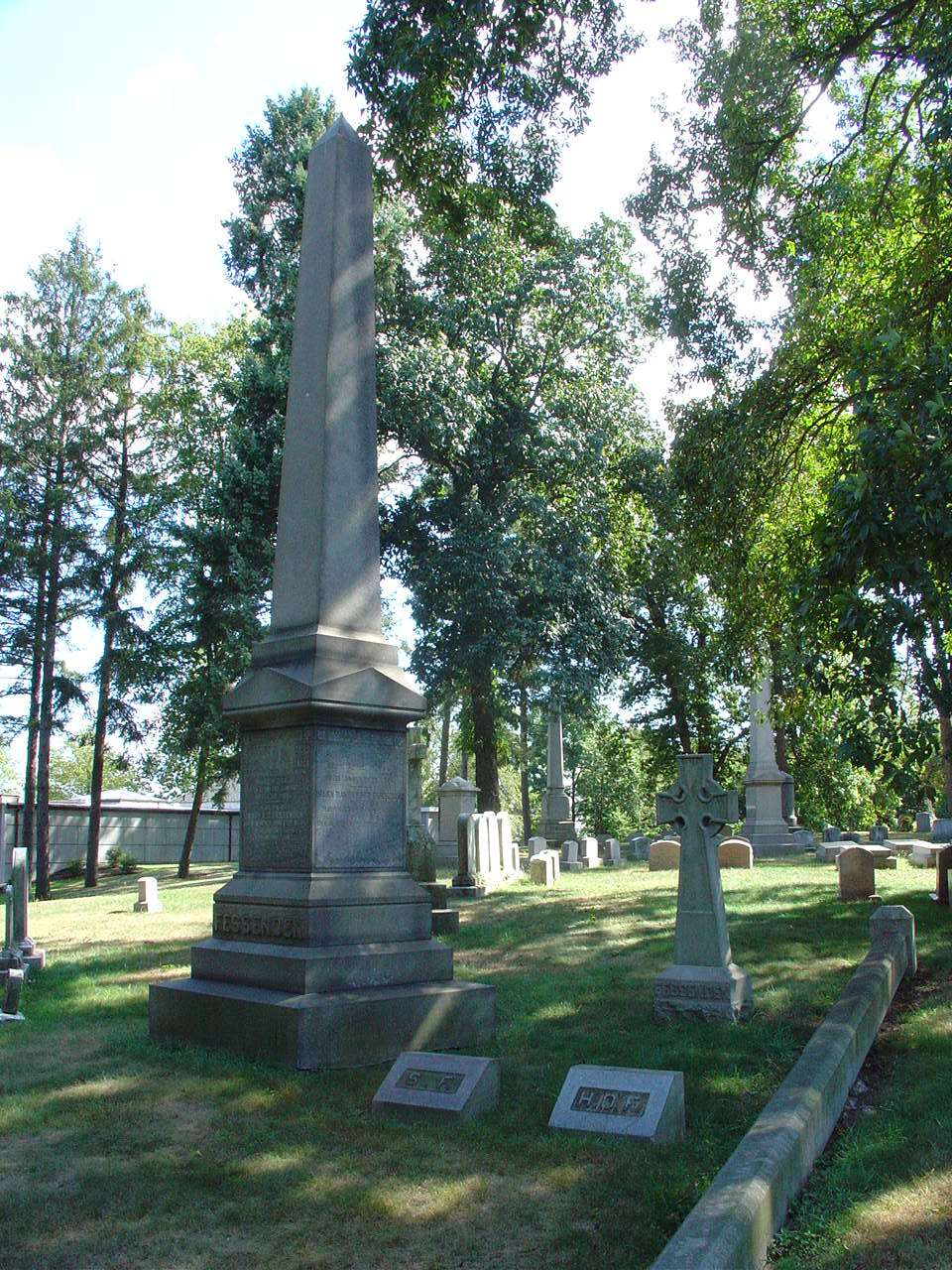After the war he returned to his studies, deciding upon the law as a profession. He chose Harvard Law School and graduated with the degree of Bachelor of Laws. In 1867 his parents moved to Stamford, and two years later he joined them. He was admitted to the Bar of Fairfield County in 1869, and soon became very popular within the ranks of the Republican Party.
He married Helen M. Davenport, daughter of Theodore and Harriet Chesebrough Davenport, in June 1873.
Samuel was elected as a State Representative in 1874, 1878 and 1894. He also served as State Senator in 1905 and 1907. In 1880, he became State’s Attorney for Fairfield County, a position he held until his death. In 1877 he formed a partnership with Galen A. Carter, Jr. to start the firm of Fessenden & Carter, which rapidly developed into an extensive practice.
On the national political scene he represented the State of Connecticut at the Republican National Convention in Cincinnati in 1876, proudly casting his ballot for James G. Blaine of Maine. In 1880, he once again was chosen to represent Connecticut, this time at the Republication National Convention in Chicago. Four years later he was elected as secretary of the Republican National Committee, a position which he held for many years until declining health forced his resignation.
He belonged to the Fairfield County Bar Association and was a director of the Stamford National Bank and the Stamford Trust Company. There were also memberships in several fraternal organizations, but the one that gave him the greatest satisfaction was the G. A. R. [Grand Army of the Republic]. As the years passed by and the ranks of his comrades in arms began to diminish, he devoted time to addressing their needs—which they acknowledged with gratitude. He died at his home in Stamford on January 7, 1908. Fessenden was born into a famous family in Maine and enlisted at age16 in the Seventh Maine Battery at the outbreak of the Civil War. He fought in the Wilderness Campaign, was recommended by U.S Grant for commission by Pres. Lincoln as a lieutenant and then served on Gen. A.P. Howe's staff. In 1870, Fessenden graduated from Harvard Law and served as a trial lawyer and States Attorney in Fairfield Cty, CT. He was a major part of the Republican Party in the 1880' s and 90's, speaking at four Conventions. He was Secretary of the Republican National Committee in 1884 for his personal friend, presidential candidate, James G. Blaine. Mr. Fessenden was born in Rockland, Maine, April 12, 1847. The opening of the war found him preparing for college at the Lewiston Academy. Two years later, then a well-grown boy of sixteen years, he resolved to give up or postpone his college plans and enter the army, which he did by enlisting as a private in the Seventh Maine Battery. He served under Grant in that fierce, destructive, but glorious campaign marked by those names of dread import: Wilderness, Spottsylvania, Cold Harbor and Petersburg, and, on a recommendation from General Grant, received an appointment by President Lincoln, as First Lieutenant and afterwards as Captain, in the Second U. S. Infantry. His preference being for the artillery service, he declined promotion in the regulars, to accept a commission in the First Maine Battery. Later, he was appointed on the staff of Major General A. P. Howe, and remained in that position until he retired to civil life soon after the close of the war. He then applied himself, with characteristic energy and determination, to the study of law, at the Harvard Law School. March 4, 1869, he was admitted to the Fairfield County bar—his family having moved to Stamford. He began the practice of his profession as a member of a law firm in which his seniors were the late Joshua B. Ferris and Calvin G. Child. Upon the retirement of Mr. Child to form a co-partnership with Mr. N. R. Hart, the firm remained under the title of Ferris & Fessenden, until the withdrawal of Mr. Ferris from all active professional work, when the present firm of Fessenden & Carter was formed. Mr. Fessenden's eminent qualities as a lawyer, his many and remarkable legal successes, and his work as the State's Attorney, are among the most notable and striking incidents in the history of the Fairfield County bar for the last twenty years, more especially during the last half of that period.
After the war he returned to his studies, deciding upon the law as a profession. He chose Harvard Law School and graduated with the degree of Bachelor of Laws. In 1867 his parents moved to Stamford, and two years later he joined them. He was admitted to the Bar of Fairfield County in 1869, and soon became very popular within the ranks of the Republican Party.
He married Helen M. Davenport, daughter of Theodore and Harriet Chesebrough Davenport, in June 1873.
Samuel was elected as a State Representative in 1874, 1878 and 1894. He also served as State Senator in 1905 and 1907. In 1880, he became State’s Attorney for Fairfield County, a position he held until his death. In 1877 he formed a partnership with Galen A. Carter, Jr. to start the firm of Fessenden & Carter, which rapidly developed into an extensive practice.
On the national political scene he represented the State of Connecticut at the Republican National Convention in Cincinnati in 1876, proudly casting his ballot for James G. Blaine of Maine. In 1880, he once again was chosen to represent Connecticut, this time at the Republication National Convention in Chicago. Four years later he was elected as secretary of the Republican National Committee, a position which he held for many years until declining health forced his resignation.
He belonged to the Fairfield County Bar Association and was a director of the Stamford National Bank and the Stamford Trust Company. There were also memberships in several fraternal organizations, but the one that gave him the greatest satisfaction was the G. A. R. [Grand Army of the Republic]. As the years passed by and the ranks of his comrades in arms began to diminish, he devoted time to addressing their needs—which they acknowledged with gratitude. He died at his home in Stamford on January 7, 1908. Fessenden was born into a famous family in Maine and enlisted at age16 in the Seventh Maine Battery at the outbreak of the Civil War. He fought in the Wilderness Campaign, was recommended by U.S Grant for commission by Pres. Lincoln as a lieutenant and then served on Gen. A.P. Howe's staff. In 1870, Fessenden graduated from Harvard Law and served as a trial lawyer and States Attorney in Fairfield Cty, CT. He was a major part of the Republican Party in the 1880' s and 90's, speaking at four Conventions. He was Secretary of the Republican National Committee in 1884 for his personal friend, presidential candidate, James G. Blaine. Mr. Fessenden was born in Rockland, Maine, April 12, 1847. The opening of the war found him preparing for college at the Lewiston Academy. Two years later, then a well-grown boy of sixteen years, he resolved to give up or postpone his college plans and enter the army, which he did by enlisting as a private in the Seventh Maine Battery. He served under Grant in that fierce, destructive, but glorious campaign marked by those names of dread import: Wilderness, Spottsylvania, Cold Harbor and Petersburg, and, on a recommendation from General Grant, received an appointment by President Lincoln, as First Lieutenant and afterwards as Captain, in the Second U. S. Infantry. His preference being for the artillery service, he declined promotion in the regulars, to accept a commission in the First Maine Battery. Later, he was appointed on the staff of Major General A. P. Howe, and remained in that position until he retired to civil life soon after the close of the war. He then applied himself, with characteristic energy and determination, to the study of law, at the Harvard Law School. March 4, 1869, he was admitted to the Fairfield County bar—his family having moved to Stamford. He began the practice of his profession as a member of a law firm in which his seniors were the late Joshua B. Ferris and Calvin G. Child. Upon the retirement of Mr. Child to form a co-partnership with Mr. N. R. Hart, the firm remained under the title of Ferris & Fessenden, until the withdrawal of Mr. Ferris from all active professional work, when the present firm of Fessenden & Carter was formed. Mr. Fessenden's eminent qualities as a lawyer, his many and remarkable legal successes, and his work as the State's Attorney, are among the most notable and striking incidents in the history of the Fairfield County bar for the last twenty years, more especially during the last half of that period.
Family Members
Sponsored by Ancestry
Advertisement
Explore more
Sponsored by Ancestry
Advertisement













